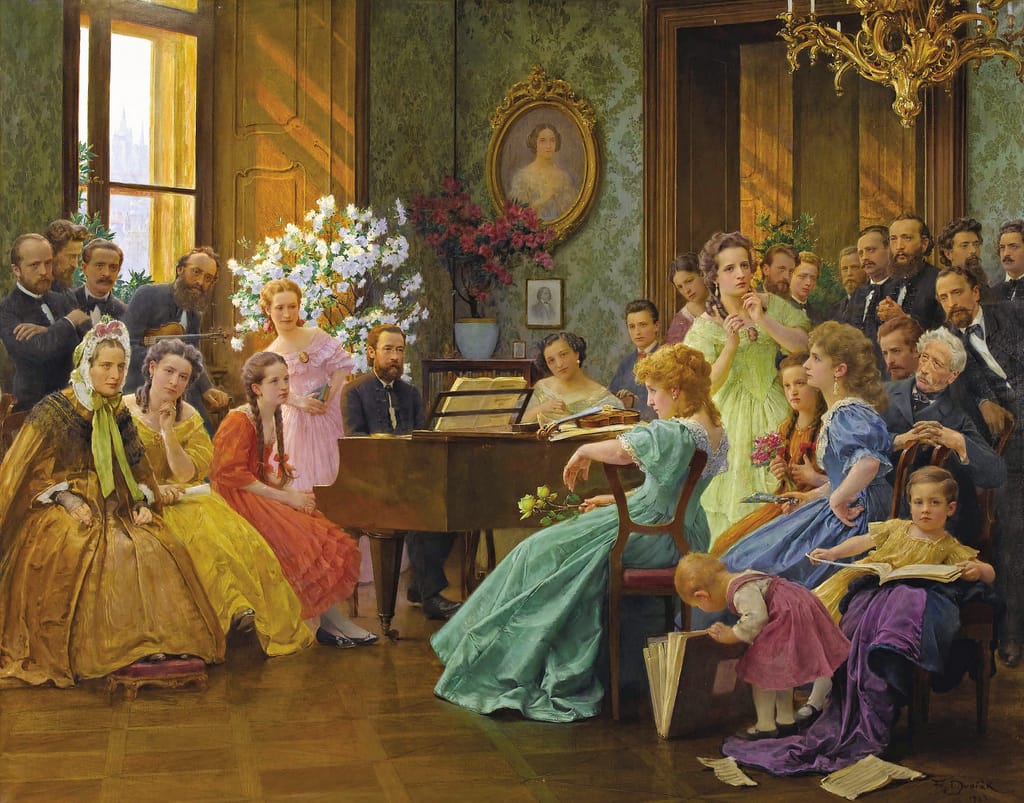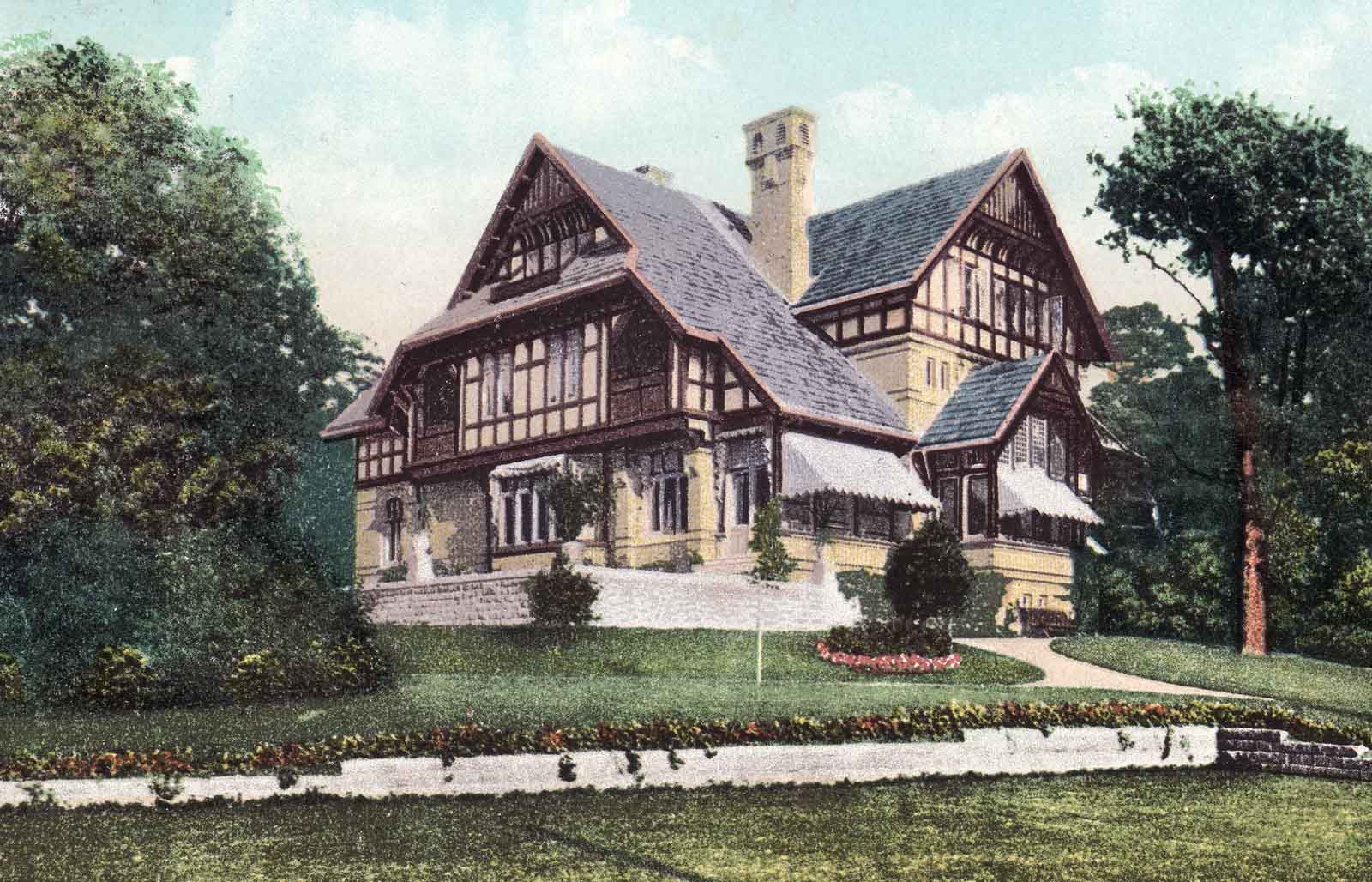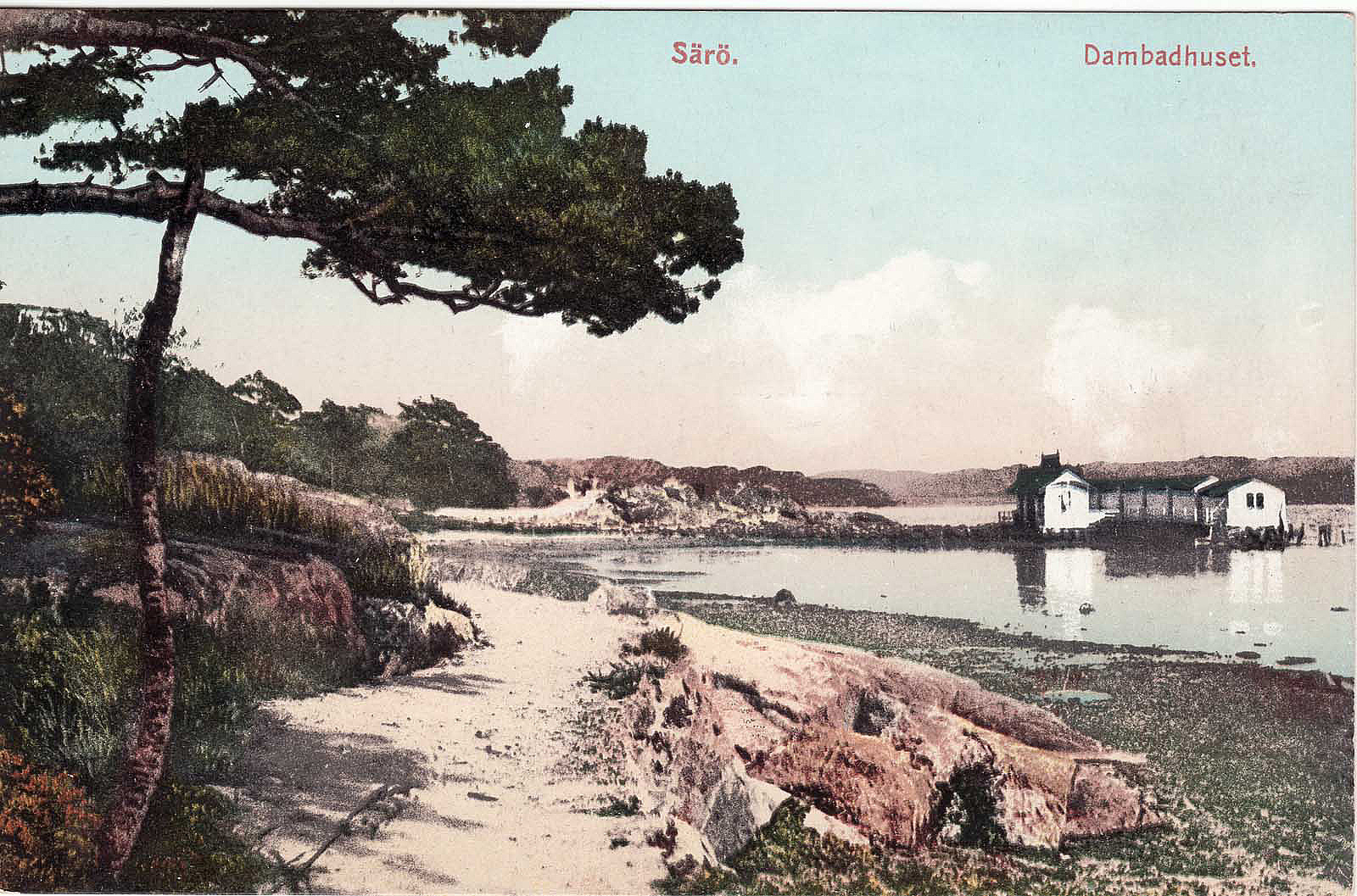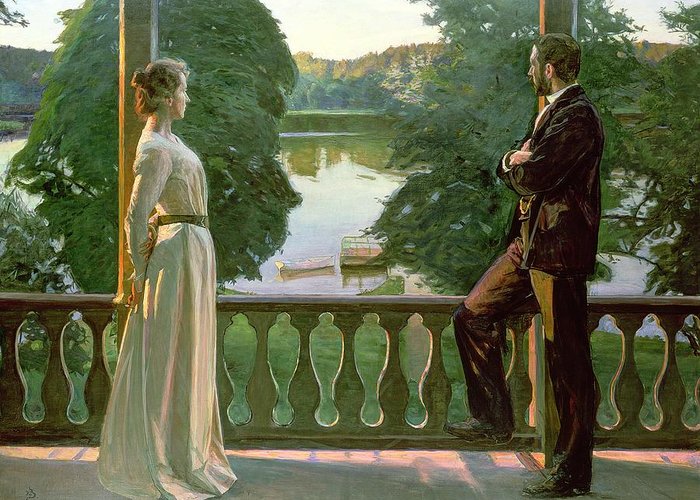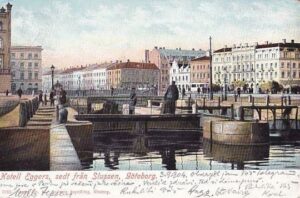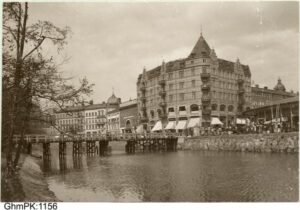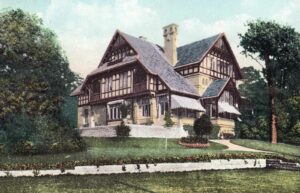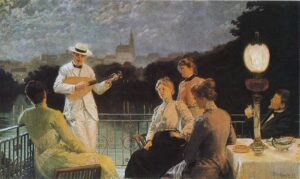



My Fatherland, is a set of six symphonic poems composed between 1874 and 1879. It contains the famous symphonic poem „Vltava„, also popularly known by its German name „Die Moldau“ that has made him famous all over the world.
Má vlast – Vltava — My Fatherland – Moldau
The most famous part of Smetana’s series of symphonic poems “My Fatherland” describes the flow of the river Moldau through the Bohemian countryside. The poem begins with the onomatopoeic counterpoint of the winds which represents several streams coming together into one massive flow which is then depicted by the theme, an impressive harmony and unique colorful instrumentation, uplifted to a patriotic apotheosis, despite its simple lyricism.
– B. Smetana:
“The piece describes flow of the Moldau, beginning with the first two streams, the cold and warm Moldau, which connect to form one current. Then, the flow of the Moldau through the woods and meadows, the countryside alive with joyful celebrations, the dances of the fairies, the castles, chateaus, and ruins towering proudly on the surrounding mountains, the Moldau rushing in the Midsummer streams, flowing through the wide canal towards Prague. Vyšehrad appears, finally disappearing in the distance in the majestic flow of the Elbe.”
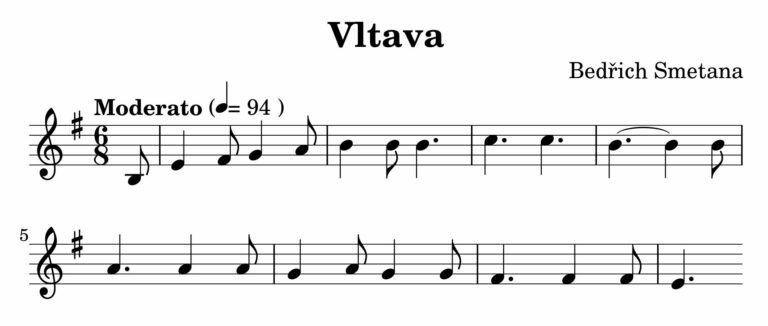

introduction (en)
We present a new feature film based on the life of Bedřich Smetana. In 2024, we will commemorate the 200th anniversary of his birth and the 140th anniversary of his death. Why should we remember the founder of Czech national opera and composer of iconic nineteenth century symphonies in a different manner than usual? Smetana didn’t reach their heights of Franz Liszt and Richard Wagner, whom he both admired, or the fame of Antonín Dvořák and Leoš Janáček yet his work and his personality are the subject of consistent attention of experts, interprets and audiences worldwide. His life was a never-ending struggle to make something of himself against all odds, not unusual for a great historical figure. Admirably, he composed his greatest works after his complete loss of hearing. His private life and relationships with women are a whole other story, one that inspired our screenplay. Like other great musical figures of the past, Smetana was inspiring for his obsession with work and unquenchable thirst for emotional connection and experience against all conventions of his time. Because of this, he is a character of relevance and ambiguity, and his works are an original soundtrack to accompany the captivating life story of an extraordinary man.
Smetana’s music and life story are universal which is a concept we would like to retain when choosing the cast of the future film, which will be composed of both Czech and international actors and actresses of reknown. In interest of historical accuracy and her nationality, we would like Fröjda to be portrayed by a member of the up-and-coming generation of European actresses. Therefore, the film would portray the legacy and work of the composer in an international sense, in the best possible way.
FEDA – FULL – VOCAL + VIOLIN
The name of Frojda appears in the music composition. F-E-D-A tones are sounded with vocals.
Recording produced by Jan Valta / Produkce nahrávky: Jan Valta
představujeme (cz)
Představujeme nový celovečerní film o Bedřichu Smetanovi. V roce 2024 si připomeneme výročí 200. let od jeho narození i 140 let od jeho úmrtí. Proč si zakladatele české národní opery a skladatele významných symfonických děl 19. století připomenout jinak, než je obvyklé? Smetana, obdivovatel Franze Liszta, Richarda Wagnera nedošel světové proslulosti jako oni nebo věhlasu Antonína Dvořáka, Leoše Janáčka, přesto jeho dílo i osobnost jsou předmětem soustavné pozornosti odborníků, interpretů a těší se pozornosti posluchačů na celém světě. Jeho život byl nekonečný zápas o své prosazení navzdory nepřízni okolí, tak jak už to u velkých postav historie bývá obvyklé. Je obdivuhodné, že největší díla složil i po totální ztrátě sluchu a jeho soukromý život a vztah k ženám je příběhem sám o sobě a stal se inspiračním zdrojem našeho filmového scénáře. Smetana jako další velké hudební figury minulosti je inspirativní pro svou posedlost prací i neodbytnou potřebu citového zaujetí a prožitku přes všechny konvence doby. V tomto ohledu je bytostí navýsost současnou, nejednoznačnou a jeho hudební dílo je originální filmovou hudbou pro strhující příběh výjimečného člověka.
K hereckému obsazení:
Tak jak je hudba a příběh Bedřicha Smetany univerzální, stejně tak bychom chtěli komponovat herecké obsazení budoucího filmu z výrazných hereckých osobností – českých i zahraničních. Rádi bychom zachovali historickou pravdivost a představitelku Fröjdy našli právě s ohledem na její národnost v nastupující výrazné herecké generaci evropských hereček. Film by tím tak v nejlepším slova smyslu reprezentoval odkaz a dílo skladatele v nadnárodním pojetí.
SYNOPSIS (EN)
In 1883, Fröjda Benecke, charismatic widow of a Gothenburg ship-owner, arrives in Jabkenice, where a deaf and half-mad old man lives in solitude and silence. The man is a composer Bedřich Smetana. He doesn’t recognize Fröjda, whom he fell in love with many years ago. But in her presence, he slowly recalls the beginnings of his artistic career when he accepted a conducting post in Gothenburg.
In 1856, Smetana had failed to establish a musical career in Prague and lost three of his four daughters, his own wife Kateřina’s health begins to fail, too. Therefore, he travels to Gothenburg, where he is admired, and accepted by the crème de la crème of culture and society.
At his first concert, he is introduced to Fröjda, a twenty-year-old socialite, wife, mother, and aspiring pianist and is dazzled by her. She is similarly taken by him. Their lives are eerily similar. Both have spouses who don’t understand their passion for music. Both have lost a child and suffered. Both want to break free of the conventions of society.
Smetana’s stay in Gothenburg inspired him greatly and he composed many symphonic poems, such as Impromptus, Bagatele and Ball Vision. He drew a great deal of inspiration from his passionate yet platonic relationship with Fröjda. Smetana wants an intimate relationship with her, but she vows to remain loyal to her husband. Unfortunately, their guarded closeness becomes a subject of gossip which travels overseas and reaches Kateřina, who has stayed behind in Prague.
Determined to save her marriage, Kateřina travels to Gothenburg with her last surviving daughter Žofie and her unmarried sister, Alžběta, who serves as her caregiver. In Gothenburg, Kateřina finds out about the true depth of Smetana’s feelings towards Fröjda and is grief stricken. The cold weather takes a toll of her health. Eventually, Smetana has no choice but to abandon his post and take his family back to Prague, so Kateřina can see her home again before she dies. Smetana is forced to say goodbye to Fröjda who vows never to forget him or their love. Smetana travels back to Prague but Kateřina does not make the journey.
Back in 1883, Smetana is being taken care of by his daughter Žofie but his health and rapidly deteriorating mental state make him dangerous to himself and others. His most famous compositions sound in his head, the arias tangled together. Some compositions anticipate the style of modern 20th century music. He hallucinates. Fröjda tries to get Smetana to recognize her through a musical motif which he once incorporated into his composition in her honour but ultimately lashes out at her and doesn’t want anything to do with her. Fröjda offers Žofie money, collected by her friends in Gothenburg to get treatment for Smetana abroad and departs. At that moment, Smetana remembers her, but she has already left forever.
The film is narrated without any historical pathos. We see the composer as a man riddled with doubts and deep feelings, we follow the artistic beginnings of an extremely talented musician who could incorporate his own emotions into his work. At the end of his life when he loses his mind, he is still a man ahead of his time, a man whose style resembles 20th century modernists. The story doesn’t present Smetana as a figure from a textbook but rather as a modern human being confined by conventions of 19th century.
SYNOPSE (CZ)
Celovečerní film zachycuje životní etapu českého hudebního skladatele Bedřicha Smetany. Vedle Dvořáka a Janáčka je Smetana zakladatelem české i představitelem evropské hudební kultury 19. století. Příběh je soustředěn na jeho působení v Göteborgu. Portrét je intimní, expresivní a díky romanci mezi skladatelem a švédskou mecenáškou přibližuje velikána velmi současně.
Krásná a charismatická Fröjda Benecková, žena göteborského rejdaře, zavítá v roce 1883 do Jabkenic, kde v tichu a osamění u své dcery Žofie žije hluchý a napůl šílený stařec. Je to starý Smetana. Svou životní lásku nepoznává, zbytek příčetnosti mu vybavuje vzpomínky na dobu prvního zahraničního angažmá.
Po úmrtí tří dcer a zejména té poslední nejnadanější, Smetana lodí cestuje do Göteborgu, pryč z Prahy, která není Smetanovi nakloněna. Po příjezdu se seznamuje s kulturní a společenskou smetánkou města, hned na prvním bále poznává charismatickou Fröjdu, která září a oslňuje. Smetanu, který bude ve městě dávat hodiny klavíru a vést místní sbor, tato žena zaujme svou bezprostředností a krásou. Svou manželku Kateřinu, kterou skladatel zná od devatenácti let a která trpí nevyléčenou tuberkulózou, Smetana zanechal v Praze. Prostředí Göteborgu inspiruje Smetanu ke složení symfonických básní Impromtus, Bagatele a jméno Fröjdy, tóny F-E-D-A vkomponuje do kusu Vidění na plese. Doslova vidíme, jak se dravé životní impulsy proměňují v první charakteristické Smetanovy symfonické básně. Jsme svědky tvůrčího procesu. Komponování jde v ruku v ruce s vášní, s jakou Smetana propadá Fröjdě. Oba jsou svým způsobem poznamenáni stejným osudem, jsou zadaní, jejich protějšky jim neposkytují lásku a životní naplnění. Oba hrdinové však nemohou překročit konvenci doby, i když jsou unášeni až na samý kraj možného. Do Göteborgu přijíždí Smetanova manželka Kateřina s dcerou Žofií a sestrou Alžbětou. Kateřina se dozvídá o mimomanželském vztahu, o jeho hloubce a sžíravosti. Göteborg je příliš malý, aby se tak divoký a turbulentní vztah na veřejnosti ututlal. Kateřina ze všech sil bojuje o Smetanu. Sestra Alžběta, která doprovází Kateřinu jako její zdravotní sestra, s dcerou Žofií opouští Göteborg. Smetana skládá Richarda III. a Fröjda je zoufalá, umírá ji syn. Kateřina je na pokraji svých sil a její zdravotní stav naznačuje trpký konec. Smetana opouští Göteborg a odjíždí do Prahy. Kateřina na cestě umírá.
Jsme zpět na začátku, v roce 1883. Ovdovělá Fröjda předává Žofii peněžní sbírku švédských přátel na Smetanovo léčení hluchoty. Na to je však už pozdě. V posledních záblescích vědomí Smetana Fröjdu poznává, ta Jabkenice opouští. Smetana se v záchvatu zuřivosti stává nezvladatelným a nebezpečným sobě i okolí. Skladatelův osud je naplněn.
Film je vyprávěn bez jakéhokoliv historického patosu, vidíme skladatele jako pochybujícího, citem zmítaného člověka, který je obdařen mimořádným talentem a hudebností, s jakou své životní pocity vkládá do svého díla. Na konci života jako by předběhl svou dobu a svým stylem připomíná modernisty 20. století. Příběh neportrétuje Smetanu jako čítankovou osobnost, ale přibližuje ho současným divákům jako lidsky podmanivý charakter své doby.
Film je určen nejširšímu publiku, v žánru historického dramatu s hudebním doprovodem B. Smetany.
On the Seashore
Bedřich Smetana finds himself out of the creme-dela creme society after his arrival to Gothenburg and Fröjda Benecke guides him. Excerpt of the screenplay and animatic – the storyboard of the scene with music by Bedřich Smetana On the Sea Shore.
Excerpth of The Script
EXT, GOTHENBURG – BEACH, DAY
In the winter, the sand is white and the sea is grey. A cold wind blows. But the view bathed in golden sunlight is beautiful. The rocks are covered with moss.
B. SMETANA – ON THE SEASHORE, OP. 17
Smetana walks across the sand, captivated. He then turns to look at Frojda who stands close by the waves and looks into the distance.
Frojda looks at the sea and then takes off her hat with a smile. She reaches into her firmly braided hair and takes out her hairpin, letting her hair fall down her back. Then she loosens her shawl, exposing her throat. Smetana turns his entire body towards her but hesitates to approach her. Frojda turns to him. The cold wind ruffles her
hair. She looks like a beautiful vision.
A gust of wind loosens her shawl and carries it away. Smetana rushes to catch it, Frojda runs after him, they chase each other. Smetana catches the shawl but when Frojda reaches for it, he pulls it out of her reach. Frojda bursts out laughing and tries to snatch it. Finally, Smetana hands it to her, love in his eyes. Their fingers brush.
Orchestral arrangement & recording production: Jan Valta / Orchestrální aranžmá a produkce nahrávky: Jan Valta
One of the greatest Czech composers of the nineteenth century and the country's first nationalist composer, having incorporated folk songs, dances, written operas and other works in celebration of the Czech history and language. Along with Dvořák, Janáček , and Martinů, he is one of the most recognized Czech classical music composers, and many critics have labeled him universal rather than geographical in scope. He is best known for his symphonic poem Vltava (The Moldau), the second in a cycle of six entitled My Fatherland and the comic opera The Bartered Bride.
Bedřich Smetana is plagued by a secret which enriches his music.
Is being unfaithful physically worse than cheating emotionally?
Is physical infidelity worse than emotional?
Beautiful Swedish socialite, pianist and later patron of the arts. She falls in love with Smetana because they share a passion for music. Although naïve at the start, Frojda grows up to be fine woman, who is morally steadfast. The loss of husband, lover and son strengthen her relationship to music which gradually becomes her life’s purpose.
main characters
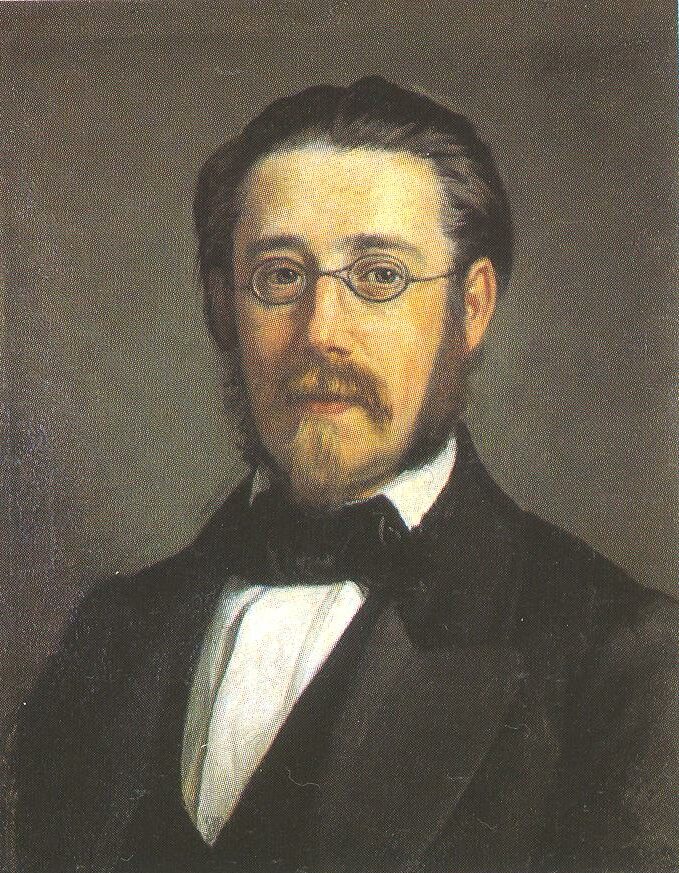
Bedřich Smetana
B. Smetana, how he looked during his stay in Gothenburg (1856–1861). Painting by J. P. Södermark. Source: commons.wikimedia

Fröjda
Beautiful Swedish socialite, pianist and later patron of the arts. She falls in love with Smetana because they share a passion for music. Source: commons.wikimedia
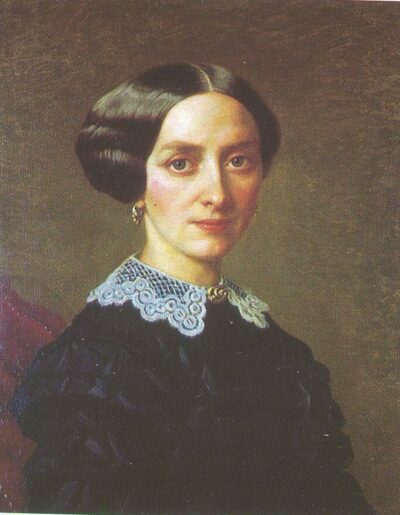
Kateřina
Smetana’s wife. Fragile in constitution but firm in her decisions and opinions. She suffers from tuberculosis and the loss of three children, giving her no choice but to fight for who remains. Source: commons.wikimedia
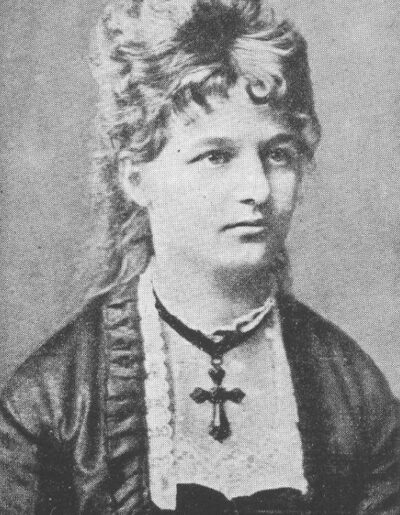
Žofie
Smetana’s only surviving daughter. She takes care of a household, a husband, several children and her deaf father, leaving her with no time for herself. Source: commons.wikimedia
-
HEROLDOVO KVARTETO / HEROLD QUARTET (1)
The 2nd quartet, which presents Smetana’s “modernist” approach in his last orchestral work, which,
-
HEROLDOVO KVARTETO / HEROLD QUARTET (2)
The 2nd quartet, which presents Smetana’s “modernist” approach in his last orchestral work, which,
-
HEROLDOVO KVARTETO / HEROLD QUARTET (3)
The 2nd quartet, which presents Smetana’s “modernist” approach in his last orchestral work, which,
-
HEROLDOVO KVARTETO / HEROLD QUARTET (4)
The 2nd quartet, which presents Smetana’s “modernist” approach in his last orchestral work, which,
